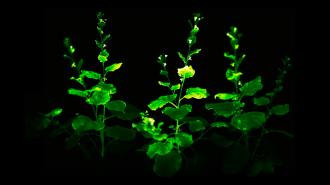Biotech firm Light Bio has used gene-editing to create bioluminescent plants — and you can now order one of its glowing houseplants for just $29.
Nature is lit: From fireflies to glowing jellyfish, the tree of life is sprinkled with organisms capable of creating and radiating light. This phenomenon is called “bioluminescence,” and it can be vital to a creature’s survival, helping them attract prey or avoid predators.
Bioluminescence is common in the oceans but relatively rare on land, and while there are examples of glowing animals, bacteria, and fungi, there aren’t any naturally bioluminescent plants.
“This milestone — and the magical experience we are bringing to people across the country — has been decades in the making.”
Keith Wood
We can make bioluminescent plants, though. In 1986, UC San Diego scientists created the first glowing plant by inserting genes from fireflies into tobacco plants. Since then, other bioluminescent plants have been created for research into genetics, energy, and more.
What’s new? Keith Wood, a member of that first groundbreaking UCSD team, is now helping bring the beauty of bioluminescent plants to the masses through Light Bio.
By inserting genes from bioluminescent mushrooms into petunias, the Idaho-based biotech firm gave the flowering perennial the ability to glow a soft green in the dark. They call their glowing houseplant a “Firefly Petunia.”
In September 2023, the USDA determined that the bioluminescent plants were safe to breed and grow, and Light Bio has now announced that it’s ready to start selling the plants to people in the contiguous US.
“This milestone — and the magical experience we are bringing to people across the country — has been decades in the making … We can’t wait to see their reactions and to discover the bright future ahead for this incredible technology,” said Wood, Light Bio’s CEO.
The details: Light Bio is currently accepting preorders for 50,000 Firefly Petunias. They cost $29 each (plus a $24 shipping fee), but the company is offering discounts on orders of three or more and free shipping if you buy at least 10 plants. The first shipments will go out in April 2024.
The bioluminescent plants don’t require any special light or food, but Light Bio says the healthier they are, the brighter they glow, so you’ll want to make sure to take care of your Firefly Petunia with plenty of sunlight, just enough water, and all the other things that keep plants happy.
“[The plants] invite people to experience biotechnology from a position of wonder.”
Drew Endy
The big picture: Glowing houseplants aren’t exactly going to change the world, but they could help reshape people’s perception of gene-editing from something “scary” into something magical — and that could change the world.
“[The plants] invite people to experience biotechnology from a position of wonder,” Drew Endy, an associate professor of bioengineering at Stanford University, who isn’t involved with Light Bio, told Wired.
We’d love to hear from you! If you have a comment about this article or if you have a tip for a future Freethink story, please email us at [email protected].






